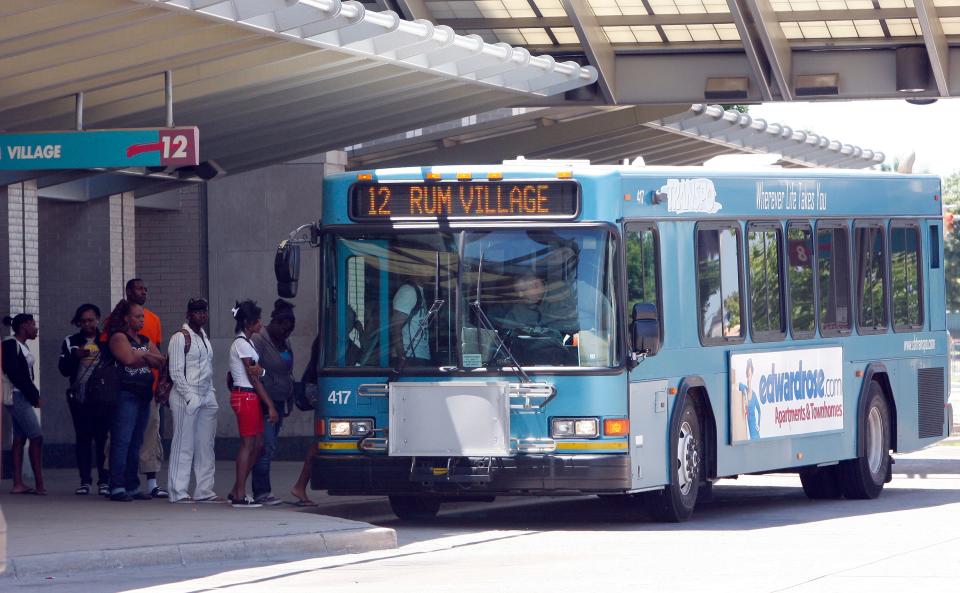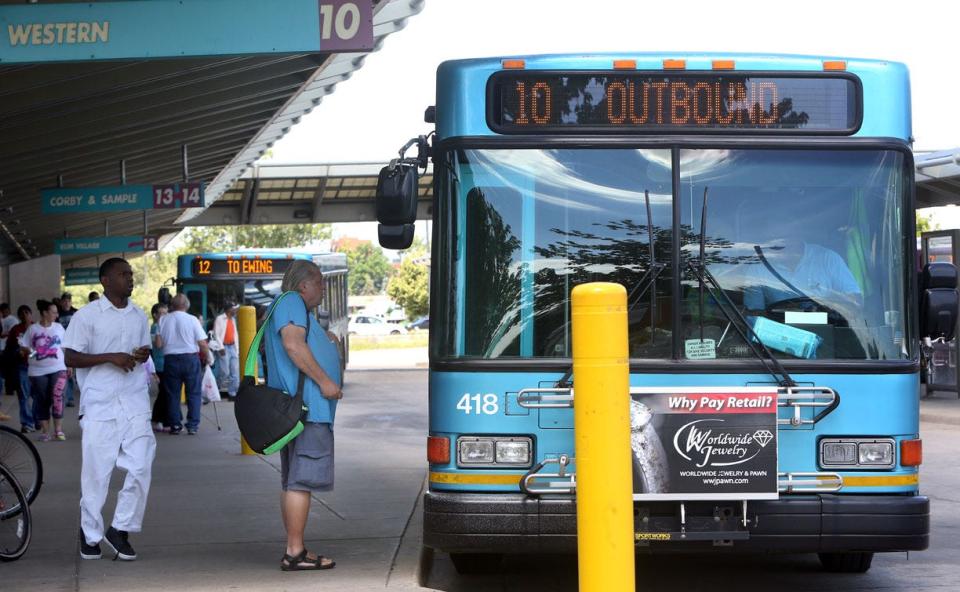South Bend Transpo staffing shortage leading to uptick in missed trips, driver burnout
SOUTH BEND — In the nearly 18 years that he's driven a bus for the South Bend Public Transportation Corp., Kevin Edwards has come to feel a deep sense of responsibility for the riders he serves daily.
"You’ve got somebody who’s trying to get to work or get to a doctor’s appointment,” Edwards said. “You just feel accountable for making sure this stuff gets filled.”
So the fact that Transpo has canceled three times as many trips in the first five months of 2022 as it does in a typical year bothers him. It worries other drivers, too, many of whom have consistently volunteered to work overtime amid a staffing shortage at the public transit agency.

Assessment appeal deadline looms: Here's how to handle an appeal in St. Joseph County.
"Drivers have really stepped up," said Edwards, the president of the local Amalgamated Transit Union. "It’s unbelievable the hours that we’re putting in and have been since last year. But we’re at the point where people are getting burned out and fed up.
“Without these drivers stepping up," he said, "trips don’t get filled."
Public transit organizations across the country, in keeping with the rest of the economy, haven't been able to hire enough workers to maintain smooth operations, Transpo CEO Amy Hill said. The South Bend agency is short about a dozen fixed-route drivers from the 57 it would employ at full capacity.
Current drivers are compensating by working well over 40 hours a week, according to Edwards. All services, such as the popular free rides given to K-12 students from June to August, are still in effect.
But the effort hasn't prevented an uptick in "missed trips," which occur when buses fail to arrive at an appointed time, forcing riders to wait up to an hour for a later trip.
Whereas Transpo misses about 17 trips in a normal year because of mechanical failures or inclement weather, the agency has been forced to cancel 53 trips this year as of Tuesday, Hill said. The most trips canceled in a single weekday, when there are on average some 400 rides, was six.
Rather than paring down the number of trips it offers, Hill said the agency has chosen to accept an inevitable rise in cancellations.
“We just don't have enough drivers to cover all our trips," Hill said. "We don't have enough drivers to hit all 400 trips on a weekday.”

Transpo communicates canceled trips to drivers and to the public with social media posts, she said. And with efforts such as a May hiring fare, enhanced advertising of job openings and flashing the words "Now Hiring" on every bus, the agency aims to make the inconvenience of missed trips short-lived.
Hill is clear-eyed, however, that in order to meet rider demand now and in the future, drivers need higher wages. The local union will seek pay raises this summer while negotiating a new contract. The current agreement ends in mid-August.
"At this time we don't have any additional funding becoming available," said Hill, adding that Transpo lost $200,000 of local income tax revenue for this year to the St. Joseph County 911 dispatch center.
Regardless of its budget, Hill said, "We’re going to have to do whatever we can to make sure that our pay remains competitive.”
The agency's $11.3 million 2022 budget is funded mostly by local taxes, state aid and federal dollars.
To offset lost revenue during the pandemic, Transpo received $8.5 million through the CARES Act and $2.3 million through the American Rescue Plan. The firm also received a $4.3 million federal grant this year to buy 11 new compressed natural gas buses, a cleaner alternative to gasoline.
COVID relief: Up to $130 million to South Bend, Mishawaka and St. Joseph County
Riders reliant on Transpo
More than 90,000 people boarded a Transpo bus during the month of May, according to Hill.
Standing outside South Street Station Tuesday morning, Syrie Montgomery said she hadn't yet been affected by a canceled trip. But given that she doesn't own a vehicle, her job at a local hotel would be jeopardized if the two buses she rides regularly failed to show up on time.
The same is true for Dion Gardini, who's been relying on the bus since he was about 12. Now 21, he takes it daily to his job as a manager at a local Dunkin' Donuts.
While drivers are stretched thin, common complaints riders voice about the bus schedule will likely go unaddressed.
Several riders who spoke with the Tribune lamented that buses arrive only once an hour after 6 p.m., whereas they arrive about every half-hour the rest of the day. They also complained of shortened service hours on Saturdays and no service on Sundays, when Transpo shuts down all routes.
The working-class riders who depend on the bus often can't guarantee they'll work a Monday to Friday schedule, Montgomery said.
"I just feel like they should run longer hours on Saturdays and they should be running on Sundays," she said. "How are you supposed to even get around on Sundays? I understand (the drivers) need off days. I feel like they should alternate like everybody else's job."
Drivers seek higher wages
In part to blame for the staff shortage is an aging workforce of drivers who have served for decades and are now retiring, Hill said. Low unemployment rates in the South Bend area have also entailed a struggle to find qualified applicants.
But the unusual hours and relatively low starting pay for new hires is a main deterrent.
After undergoing training and earning a commercial driver's license, new drivers make $14.42 an hour, Hill said. They are often stuck with undesirable shifts early in the mornings, late into the evenings and on Saturdays.
"We do see that our starting wages are not that competitive when you look at comparable positions in our region and across public transportation," Hill said of positions that require the special license.
Edwards said drivers haven't received a wage increase in about three years, though they received a lump sum payment in 2020 amid disruption caused by the pandemic.
The local union will soon begin negotiating a new contract with Transpo to take effect at the end of this summer. While the top pay rate is $26.22 an hour, Edwards says increases are needed across the spectrum to attract and retain drivers.
In making the case for higher wages, he describes the job of a driver as the epitome of accountability. You're on camera throughout a shift. Other drivers are monitoring your performance and sometimes need help covering routes.
And customers know every time you're late.
“You're always kind of under the watch, and it makes it a tough job," he said. "It’s a tough job but it’s a good job. We accept the challenge.”
"Wages," he added, "need to be raised across the board."
People interested in working for Transpo can apply for open positions in the employment section of the agency's website. While many transit agencies require applicants to have a commercial driver's license, Transpo will hire and train applicants to earn the license so long as they're otherwise eligible, according to Hill.
Email South Bend Tribune city reporter Jordan Smith at JTsmith@gannett.com. Follow him on Twitter: @jordantsmith09
This article originally appeared on South Bend Tribune: South Bend Transpo worker shortage missed trips driver burnout

